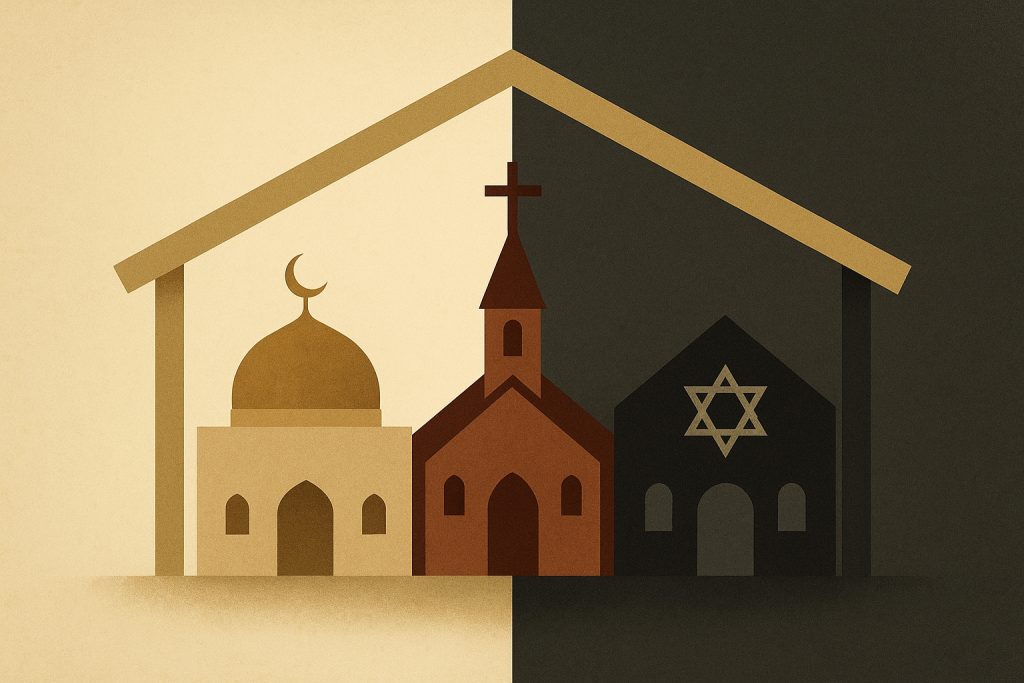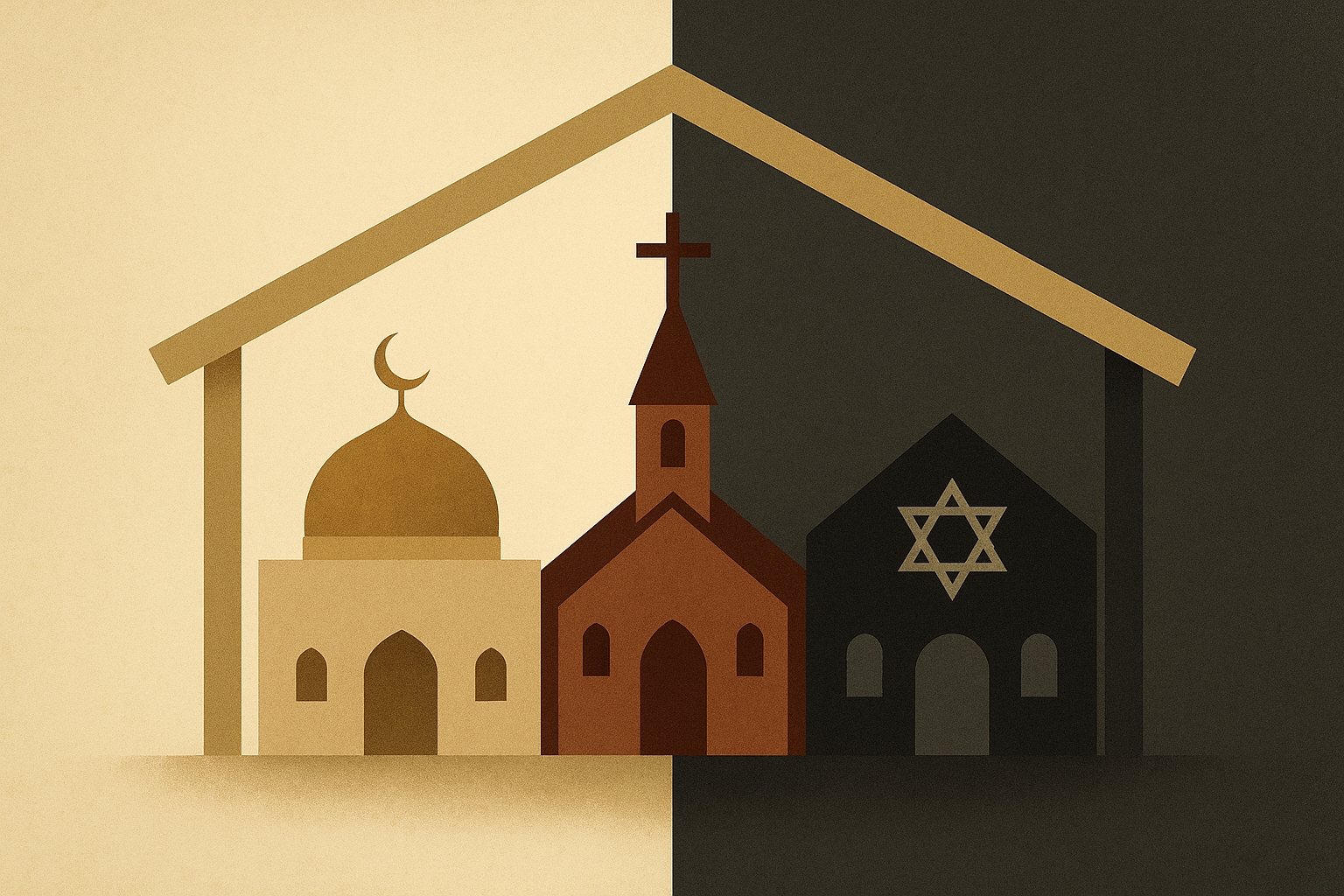Abraham Accords Islamic Analysis of Religious Unity: The Reality Behind the Abrahamic House and Abraham Accords
Abraham Accords, in recent decades, the world has witnessed a growing global discourse surrounding “interfaith harmony” and “religious unity.” This discourse, which at first appears to promote peace and mutual respect, has now evolved into an ideological project that seeks to merge the three major Abrahamic religions—Islam, Christianity, and Judaism- under a single framework. The concept, recently materialised in the form of the “Abrahamic House” in Abu Dhabi and the “Abraham Accords” signed in 2020, is being portrayed as a symbol of coexistence and universal spirituality. However, from an Islamic point of view, this movement carries profound theological and civilizational implications that challenge the very foundations of Islamic belief.

https://mrpo.pk/who-really-built-israel/
The Abraham Accords are a set of agreements that established diplomatic normalization between Israel and several Arab states, beginning with the United Arab Emirates and Bahrain.[1][2] Announced in August and September 2020 and signed in Washington, D.C. on September 15, 2020, the Accords were mediated by the United States under President Donald Trump.[3] The UAE and Bahrain became the first Arab countries to formally recognize Israel since Jordan in 1994.[4] In the months that followed, Sudan and Morocco also agreed to normalize relations with Israel, although Sudan’s agreement remains unratified as of 2024.[5] In July 2025, it was reported that the second Trump administration was seeking to expand the Accords to include Syria, Lebanon, and Saudi Arabia.[6]
The Abraham Accords were signed between Israel, the United Arab Emirates, and Bahrain in September 2020, later joined by Sudan and Morocco, under the supervision of the United States. The declaration claims to “advance peace, security, and prosperity in the Middle East” through mutual recognition, normalisation of relations, and cultural exchange. Its core philosophy, named after the Prophet Abraham (Ibrahim عليه السلام), rests on the idea that all three faiths—Islam, Christianity, and Judaism—share a common patriarchal origin and should therefore cooperate under a shared spiritual umbrella. The Abrahamic House, constructed in Abu Dhabi, embodies this concept physically through a single complex housing a mosque, a church, and a synagogue—an architectural representation of what is being called the “unity of religions.”
While this appears to be a noble call for peace, the underlying theological message is that all religions are equally valid paths to God, that differences between them are superficial, and that salvation can be attained through any of these faiths. This concept fundamentally contradicts the core teachings of Islam, which clearly state that the divine message revealed through the Prophet Muhammad ﷺ is the final, universal, and unalterable truth. The Qur’an declares unequivocally:
إِنَّ الدِّينَ عِندَ اللّٰهِ الْإِسْلَامُ
“Indeed, the religion in the sight of Allah is Islam.” (Surah Aal ‘Imran 3:19)
Furthermore, Allah Almighty states:
وَمَنْ يَبْتَغِ غَيْرَ الْإِسْلَامِ دِينًا فَلَنْ يُقْبَلَ مِنْهُ وَهُوَ فِي الْآخِرَةِ مِنَ الْخَاسِرِينَ
“Whoever seeks a religion other than Islam, it will never be accepted from him, and in the Hereafter he will be among the losers.” (Surah Aal ‘Imran 3:85)
From the Qur’anic viewpoint, Islam is not a later addition to earlier religions but their divine completion and correction. All previous revelations—such as the Torah and the Gospel—were true in their original forms but have since been altered and superseded by the final revelation of the Qur’an. The Qur’an attests:
يُحَرِّفُونَ الْكَلِمَ عَنْ مَوَاضِعِهِ
“They distort the words from their proper places.” (Surah al-Ma’idah 5:13)
Thus, Islam’s relationship with earlier faiths is not one of coexistence on equal terms, but of divine succession and culmination. The Prophet Muhammad ﷺ said:
“By Him in Whose Hand is my soul, if Moses were alive, he would have no choice but to follow me.” (Musnad Ahmad, 3/387)
This hadith affirms that all previous messages have merged into the final and universal message of Islam, leaving no room for a “joint faith” or pluralist theology that compromises Tawheed (the Oneness of God).
In this context, the Abraham Accords represent not merely a political normalization between Arab states and Israel but a subtle attempt to redefine theological boundaries and dilute Islamic exclusivity. Under the guise of peace and tolerance, it introduces a post-religious paradigm where truth becomes relative, faith becomes cultural, and divine revelation becomes negotiable. The notion of an “Abrahamic family” of religions erases the Qur’anic distinction between iman (faith) and kufr (disbelief), undermining the concept of al-wala’ wal-bara’—loyalty to the believers and disavowal of disbelief.
This theological relativism was strongly condemned by the Permanent Committee for Scholarly Research and Ifta (اللجنة الدائمة للبحوث العلمية والإفتاء) of Saudi Arabia, which issued Fatwa No. 19402, addressing the issue of religious unity. The Fatwa declared that Islam is the only valid religion in the sight of Allah and that all previous religions have been abrogated. It further warned that inviting people to unite Islam, Christianity, and Judaism under one banner is a dangerous innovation and a deceptive plot aimed at corrupting the faith of Muslims. The Committee stated:
“Whoever claims that Judaism or Christianity is still a valid religion after the coming of Muhammad ﷺ, or that they are legitimate paths to Allah, has disbelieved in what Allah revealed to His Messenger.”
The Fatwa outlined nine principal points, emphasizing that:
-
Islam is the only true religion and all others have been annulled.
-
The Qur’an is the final revelation, superseding previous scriptures.
-
The Torah and the Gospel have been altered.
-
Prophet Muhammad ﷺ is the final Messenger; no prophet will come after him.
-
Those who reject Islam are disbelievers and enemies of Allah.
-
The call for religious unity is a satanic and deceitful conspiracy.
-
Such movements blur the distinction between truth and falsehood, destroying the spirit of jihad and da’wah.
-
Muslims who promote this ideology commit apostasy.
-
It is impermissible to participate in or support initiatives promoting inter-religious unification.
These points establish a clear theological boundary: Islam allows interfaith cooperation for justice and peace, but not interfaith unification that compromises creed or worship. The Prophet ﷺ exemplified justice toward non-Muslims but never diluted Islamic principles. The Qur’an enjoins kindness and fairness toward others—
لَا يَنْهَاكُمُ اللّٰهُ عَنِ الَّذِينَ لَمْ يُقَاتِلُوكُمْ فِي الدِّينِ أَنْ تَبَرُّوهُمْ وَتُقْسِطُوا إِلَيْهِمْ
“Allah does not forbid you from being kind and just to those who did not fight you because of religion.” (Surah al-Mumtahanah 60:8)
However, it also commands:
وَقَاتِلُوهُمْ حَتَّى لَا تَكُونَ فِتْنَةٌ وَيَكُونَ الدِّينُ كُلُّهُ لِلّٰهِ
“Fight them until there is no more persecution and religion is entirely for Allah.” (Surah al-Anfal 8:39)
Hence, Islam draws a fine but decisive line between peaceful coexistence and theological compromise. The Abrahamic House crosses that line by promoting shared worship, combined scriptures, and a universal religious identity detached from revelation. It symbolically reduces Islam’s finality to one among many “spiritual options,” contradicting the Qur’an’s repeated affirmation that divine truth is singular, not plural.
From a historical perspective, similar efforts have appeared before—during the Abbasid era, under Western colonial rule, and within modern globalism—each time attempting to neutralize Islam’s spiritual and political vitality by framing it as one religion among many. The current movement differs only in sophistication, employing architecture, diplomacy, and academic discourse to achieve ideological convergence.
The real threat, therefore, is not interfaith dialogue itself—Islam encourages understanding and peaceful relations—but the hidden agenda of redefining Islam’s universality. The Qur’an addresses humanity’s diversity while affirming one ultimate truth:
لِكُلٍّ جَعَلْنَا مِنكُمْ شِرْعَةً وَمِنْهَاجًا … فَاسْتَبِقُوا الْخَيْرَاتِ
“To each of you We prescribed a law and a way… so compete in good deeds.” (Surah al-Ma’idah 5:48)
This verse promotes moral excellence without surrendering doctrinal integrity. It calls for coexistence, not convergence.
In light of the Qur’an, Sunnah, and consensus of scholars, the theory of religious unity and projects like the Abrahamic House are spiritually invalid, intellectually deceptive, and politically motivated. They aim to reshape Muslim consciousness, depoliticize the Ummah, and legitimize Zionist dominance in the region. As the Saudi Fatwa concludes, any Muslim who consciously promotes this ideology endangers his faith and identity.
In conclusion, Islam recognizes Prophet Abraham (Ibrahim عليه السلام) as the patriarch of monotheism but firmly rejects using his name to merge truth with falsehood. The faith of Abraham was one of pure submission to Allah alone—
مَا كَانَ إِبْرَاهِيمُ يَهُودِيًّا وَلَا نَصْرَانِيًّا وَلَكِن كَانَ حَنِيفًا مُّسْلِمًا
“Abraham was neither a Jew nor a Christian, but he was one inclining toward truth, a Muslim.” (Surah Aal ‘Imran 3:67)
Therefore, the genuine Abrahamic message is not the coexistence of contradictory creeds, but the unity of humanity under Tawheed. The call for “Religious Unity” as institutionalized in the Abrahamic Accords is, in essence, a call to relativism and compromise. The Muslim world must remain alert to this ideological deception and preserve its spiritual sovereignty by adhering firmly to the Qur’an and the Sunnah of the Prophet Muhammad ﷺ.
References
-
The Holy Qur’an (with translation)
-
Sahih al-Bukhari, Hadith No. 3017
-
Musnad Ahmad, Vol. 3, Hadith 387
-
Fatwa No. 19402, The Permanent Committee for Scholarly Research and Ifta (Riyadh)
-
“Abraham Accords Declaration,” U.S. Department of State, 2020
-
Ibn Kathir, Tafsir al-Qur’an al-‘Azim
-
Al-Tabari, Tafsir al-Tabari
-
Sheikh Salih al-Fawzan, Kitab al-Tawheed


